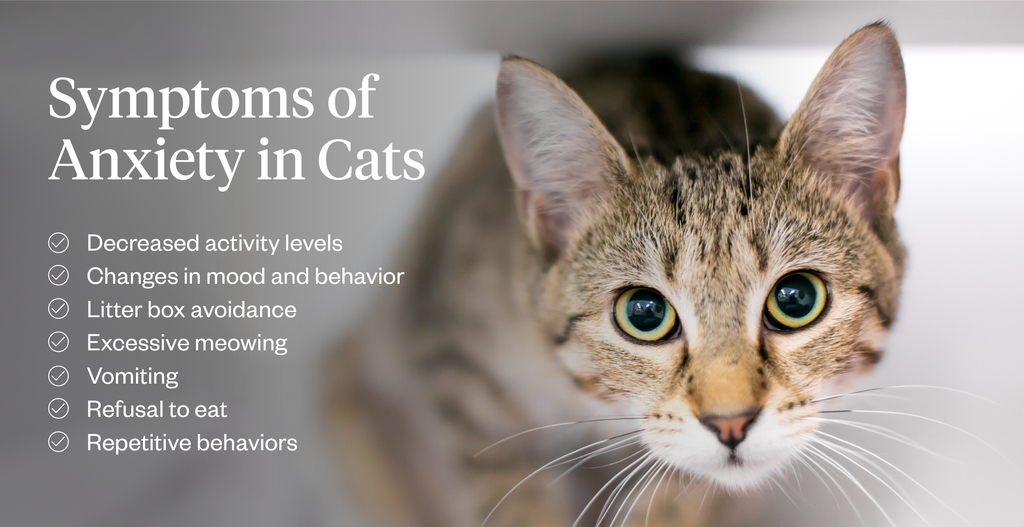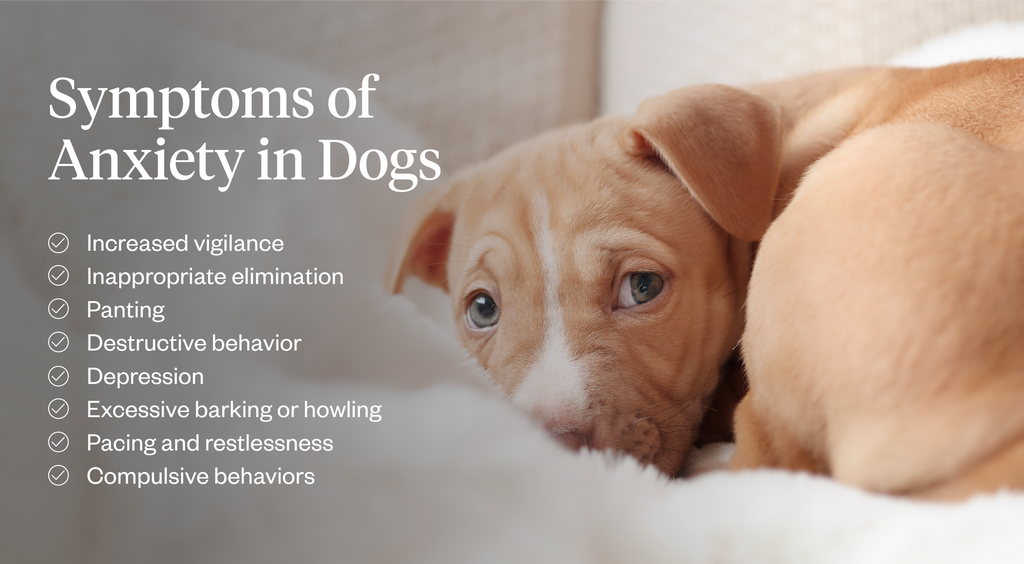10 Min Read
Acepromazine Vs. Trazodone
Key takeaway

Why pet owners are switching to online vet care with Dutch
-
Prescriptions delivered free to you
-
Fast access to Licensed Vets over video
-
Unlimited video visits and follow-ups
As a pet parent, nothing tugs at your heartstrings more than seeing your pet anxious or in distress. Anxiety in pets is challenging because it's often masked. Dogs and cats can't tell you how they're feeling in a particular situation, so it's up to you to read their body language and try to read their minds.
Whether it's the shaking during a thunderstorm, the restlessness when you get ready to leave the house, or the fear at the sight of a strange person or animal, these signs of anxiety are familiar to many pet parents. Luckily, there are several ways to help ease your pet's anxiety to help them live a more fulfilling life.
Medication is just one way vets and pet parents work together to treat and manage anxiety in pets. Keep reading to learn about two popular pet anxiety medicines for dogs and cats — acepromazine and trazodone — to help you determine which is right for your pet.
- Pet Anxiety: Symptoms, Causes & Treatment
- What is Acepromazine?
- What is Trazodone?
- Comparing Acepromazine & Trazodone
- Alternative Anxiety Medications
- Final Notes
Pet Anxiety: Symptoms, Causes & Treatment
Dog and cat anxiety are more common than you might think. Anxiety symptoms can range from mood and appetite changes to hiding or displaying more aggressive behavior.

In cats, common symptoms of anxiety include:
- Decreased activity levels
- Changes in mood and behavior
- Litter box avoidance
- Excessive meowing
- Vomiting
- Refusal to eat
- Repetitive behaviors

Dogs aren't too different from cats when it comes to anxiety. Common signs of dog anxiety include:
- Increased vigilance
- Inappropriate elimination
- Panting
- Destructive behavior
- Depression
- Excessive barking or howling
- Pacing and restlessness
- Compulsive behaviors
In addition, both dog and cat anxiety have similar causes, including:
- Separation anxiety: Both species may experience separation anxiety when you leave the house, go on long trips, or are gone longer than expected.
- Health issues: When your pet doesn't feel well, they may become anxious. Chronic illness, injury, infection, and toxin ingestion can cause symptoms of anxiety in cats and dogs.
- Trauma: Traumatic experiences can leave a lasting impact on our pets. When that trauma is triggered, it can cause anxiety.
- Environmental changes: If you move or change your home, your dog or cat might experience anxiety because they're used to a routine.
- Lack of socialization: While socialization is more commonly associated with dogs, all pets should be exposed to a wide range of environments, sounds, people, and other pets while they're young.
Luckily, there are several ways to treat anxiety in pets, including:
- Behavior modification: Behavior modification involves working directly with your pet to change their response to anxiety-inducing stimuli. Common techniques include desensitization and counterconditioning. With desensitization, the pet is gradually exposed to the source of their anxiety in a controlled manner, starting with low intensity and gradually increasing it as they become more comfortable. Counter-conditioning, on the other hand, teaches your pet to associate the stimuli with positive experiences, like treats or toys, to change their emotional response.
- Environmental management: With environmental management, pet parents create a comfortable, stress-free environment to soothe their pet's anxiety. For instance, you might create a sanctuary space for your pet if they're afraid of strangers. This way, when someone new comes to your home to visit, your dog or cat has somewhere to go to calm down. Additionally, pets typically thrive on a routine. Environmental management might mean maintaining a routine by keeping walks, feeding, playtime, and bedtime consistent so your pet always knows what to expect.
- Medication: Behavior modification and environmental management may also be paired with medication to help ease a dog or cat's stress and facilitate learning. There are several types of medications available, including short-acting anxiety medication that's used in situations you can anticipate a specific anxiety-inducing event like fireworks, thunderstorms, or a trip to the vet. Daily medication is also available if your pet experiences chronic anxiety.
What is Acepromazine?
If you're considering anxiety medication to ease your dog or cat's anxiety, your vet might suggest acepromazine, a tranquilizer.1 Acepromazine is a dopamine antagonist, a type of drug that blocks dopamine receptors in the brain.1
The FDA has approved the tablet form for dogs and cats and an injectable form to treat pet anxiety.2 It's often used in dogs to manage anxiety-related conditions or as a sedative for stressful situations like vet visits. Acepromazine is also used as a pre-anesthetic for surgical procedures.2
Although generally safe for most dogs, acepromazine is a prescription medication and should only be given under the supervision of a licensed vet.
While generally well tolerated and effective at suppressing the nervous system to help sedate pets, possible side effects may include:
- Weakness and lethargy
- Low blood pressure
- Increased heart rate
- Confusion
- Aggression
- Hyperactivity
- Seizures2
When taken orally, acepromazine lasts for around 8-12 hours, making it a short-acting medication ideal for isolated events that cause anxiety or stress in cats and dogs, such as thunderstorms, fireworks, car rides, and vet visits.2 Acepromazine is not a strong anti-anxiety medication on its own. When used alone, it acts as a sedative, but can be used to treat anxiety when paired with other anti-anxiety medications.
What is Trazodone?
Trazodone is a serotonin antagonist and reuptake inhibitor, (SARI) prescription medication used to treat anxiety in cats and dogs in anticipation of stressful events.3 Prescribed as an oral tablet, it increases the natural serotonin levels in the brain to reduce anxiety in cats and dogs.
While this medication is not approved for use by the FDA for use in dogs and cats, it has been proven effective.4 Taking effect in as little as two hours and staying effective for up to 8 hours, trazodone can help treat a wide range of acute anxiety caused by stressful events that require temporary relief.
Dosages for trazodone vary based on your dog or cat's weight and the severity of their anxiety. Your vet may prescribe 5, 100, 150, or 300-milligram tablets.5
While trazodone is generally well-tolerated among pets, the most common side effects are vomiting, diarrhea, and nausea.4 Like other behavioral medications, less common side effects may include increased anxiety or agitation, aggressive behavior, sedation, and increased heart rate.5
Trazodone is a fast-acting, short-lived medication that takes effect within 2-3 hours and generally lasts anywhere from 6-8 hours. However, every dog responds to medication differently, so you should monitor your pet to determine its duration of action.
Comparing Acepromazine & Trazodone
When comparing acepromazine vs. trazodone, it's important to keep in mind that they're both taken orally and have a relatively short duration of action to reduce the symptoms of anxiety in pets and help them remain calm. However, there are several key differences between these two anxiety medications that may prompt your vet to choose one over the other.
- Class of medication: Comparing acepromazine vs. trazodone for dogs and cats, one is a tranquilizer. Acepromazine depresses the central nervous system to produce a calming effect. On the other hand, trazodone is a serotonin antagonist and reuptake inhibitor used as an anxiolytic — anti-anxiety medication.
- Mechanism of action: Acepromazine blocks dopamine receptors in the brain to reduce anxiety. Conversely, trazodone increases the level of serotonin in the brain to regulate mood, which reduces anxiety.
- Duration of effect: Acepromazine is a short-acting medication that lasts anywhere from 8-12 hours, making it ideal for vet visits, travel, and noise phobias like thunderstorms and fireworks. However, it must be paired with another anti-anxiety medication as it is primarily used as a sedative.
- Side effects: Both pet anxiety medications are well-tolerated among cats and dogs, but they can have different side effects. For instance, acepromazine can cause a drop in blood pressure; trazodone can also cause a minor drop in blood pressure but is more likely to cause GI upset with symptoms like vomiting and diarrhea.
Alternative Anxiety Medications
Treating your pet's anxiety isn't just about comparing acepromazine vs trazodone. Every pet is different and may require various medications to help manage their anxiety and associated behavioral issues. The type of anxiety medication your vet prescribes will largely depend on whether they have chronic or episodic anxiety and what symptoms they experience.
Other anxiety medications to discuss with your vet include the following:
- Tricyclic antidepressants (TCAs): TCAs are primarily used to treat separation anxiety, generalized anxiety, and repetitive behaviors caused by stress.
- Selective serotonin reuptake inhibitors (SSRIs): SSRIs are prescribed for various types of anxiety in pets, including generalized anxiety, separation anxiety, and specific fears. By enhancing the serotonin levels in your dog's brain, SSRIs can regulate mood, decreasing anxiety in pets.
- Gabapentin: Gabapentin is an anticonvulsant commonly prescribed to pets that suffer from seizures. However, because it calms the nervous system, vets may prescribe it for chronically and situationally anxious pets.
- Benzodiazepines: Benzodiazepines are often used to manage anxiety associated with predictable events, such as vet visits, car rides, and separation from their owner.
- Supplements: While not technically medication, some vets may suggest supplements to treat anxiety in cats and dogs. Since supplements contain natural substances, they may promote a calming effect that can reduce some anxiety.
It's important to recognize that medication is not a standalone solution but rather one component of a more comprehensive approach to treating dog and cat anxiety. It might be paired with behavior modification, environmental changes, and stress management techniques to address your pet's anxiety.
Before considering any types of human medicine for dogs, such as Benadryl for dogs, discuss with a vet to make sure that it's safe.
If you're comparing trazodone vs. acepromazine, you should also integrate other methods to ensure a well-rounded and effective plan of action to treat your dog or cat's anxiety. Behavior modification can teach them healthier reactions to anxiety-inducing events and scenarios, while environmental changes can minimize triggers and help your pet stay calm throughout the day. In addition, providing your pet with enough mental and physical stimulation may alleviate anxiety.

Final Notes
Only a vet can tell you whether acepromazine vs. trazodone is a better option for your pet, or if you should consider trazodone vs. benadryl instead. While both acepromazine and trazodone can provide your dog or cat with relief from anxiety, your vet will want to consider several other factors, including triggers, the severity of the anxiety, your pet's overall health, age, breed, and any existing medical conditions.
Each pet is unique, and what works for one might not work for another. Treat dog anxiety with Dutch by talking to a licensed vet today. Then, once we've determined the appropriate action plan for your pet, you can order their medication from our online pet pharmacy and have it shipped right to your door.
Share
References
-
“Acepromazine.” ScienceDirect, www.sciencedirect.com/topics/medicine-and-dentistry/acepromazine . Accessed 31 July 2023.
-
Howe, Stephanie. “Acepromazine Maleate.” PetMD, 10 Feb. 2023, www.petmd.com/pet-medication/acepromazine-maleate.
-
Shin, Justin J, and Abdolreza Saadabadi. Trazodone - StatPearls - NCBI Bookshelf, Jan. 2023, www.ncbi.nlm.nih.gov/books/NBK470560/.
-
"Trazodone: A review of its pharmacological properties and its off-label use in dogs and cats." American Journal of Animal and Veterinary Sciences 12.4 (2017): 188-194.
-
Gruen, Margaret E., et al. "Use of trazodone to facilitate postsurgical confinement in dogs." Journal of the American Veterinary Medical Association 245.3 (2014): 296-301.
-
Maharaj, Nandini. “When Should Your Vet Use Trazodone for Your Dog?” American Kennel Club, 20 June 2023, www.akc.org/expert-advice/health/trazodone-for-dogs/.



